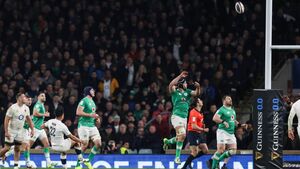Ireland’s loss proves how good Six Nations is

Despite a leap from Caelan Doris, England’s Marcus Smith kicks a drop goal to win last Saturday's 2024 Guinness Six Nations game at Twickenham. Picture: INPHO/Andrew Fosker
As a nation, we have always thrived on being the plucky underdog, attracting goodwill from countries around the world when it comes to sport and many other things as well – just look at the reaction to Cillian Murphy's Oscar success at the weekend in the world of acting.
Many jump on the Ireland bandwagon in a sporting context though, as was evidenced during the heady era for the Republic of Ireland under Jack Charlton and to a lesser extent at recent tournaments.
You could argue however that, in rugby, things are different.
Ireland are respected, feared even in some quarters, and have put together a decent string of results over a long number of years now. It wasn’t always thus, but the last decade or so has seen Ireland achieve several milestones, though the World Cup quarter-final hurdle has yet to be cleared.
The difference with Ireland in rugby is the fact that the men’s team play many of their matches as favourites.
It’s a unique position in many ways for an Irish team – and a deserved one too – but it’s hard to escape the reality that Ireland have stumbled when the chips have been down on a couple of occasions over the years. Was there too much confidence in the Irish psyche heading into the match in Twickenham over the weekend?
Saturday’s reversal against England shouldn’t be a reason for a major inquiry into the state of the game, but it does provide an interesting talking point for rugby followers in this country. Has there ever been a game between the two countries where Ireland were such overwhelming favourites?
England received a huge amount of flak for their dismal performance against Scotland last time out, when they slumped to a 30-21 defeat despite having opened up a 10-nil lead in the first-half. Duhan van Der Merwe scored a hat-trick of tries for the winners, but England’s application to the basics of the game came in for the most flak in the aftermath on Virgin Media’s television coverage.
“We were going to show you England errors as a package,” Matt Williams said, “but we’d be here for half an hour. They just made error after error after error.
“The ill-discipline was just ridiculous.” Rob Kearney was less critical of England’s overall performance, describing some aspects of their play as encouraging but still was left dumbfounded by other aspects of the display.
“That’s the best England have tried to play and the ambition that they showed and some of the running lines and the phase play was really, really good tonight.
“It was the best I’ve seen from them in a long time.
“Their skill execution was absolutely atrocious, and that’s the reason they lost the game. The amount of times they turned the ball over and handed the ball back to Scotland was atrocious.” So the signs were there – and don’t forget that England had pushed South Africa so close in their World Cup semi-final joust last autumn.
Yet heading into the weekend, Ireland had won 11 successive Six Nations games and had four wins from four in their last meetings with England.
You’d have been hard pressed to find anyone offering an angle which suggested England were potential winners on Saturday, though Irish captain Peter O’Mahony did his best to dampen expectation in his pre-match press conference.
“It’s not something that we really buy into,” O’Mahony said when asked whether the players in the camp were thinking about the hype around Ireland being such heavy favourites.
“I know you’re probably sick of hearing it from me, but it’s a Test match tomorrow, Ireland versus England. It’s about who plays better tomorrow. It’s not about anything else.
“We know if we play well we’ll be in with a shout,” he continued.
“But if we don’t fire, this English team has incredible quality and can beat anyone on their day. It’s not long ago they were competing in the last two games of the World Cup. We know we’re in for a huge test tomorrow here at Twickenham, as always.” That they were. England produced a proper display, which was permeated by a real passion and pride. It’s almost as if the traditional tables were flipped – England were relying on emotion to bring them through against an Irish side which, on all known form, should win the game. There were even tears from some of the English players while carrying out their post-match interview commitments, such was the significance of the victory for them.
The result throws up several questions but again, uncomfortably for Ireland, they came up short in a contest where it really mattered most. They strolled through their first three matches, including a traditionally difficult fixture away to France. But when it was in the melting pot, Ireland stuttered. They had control of the ball late on, with the lead in hand, and didn’t see it out.
That will sting for Andy Farrell and co.
Given the nature of the Six Nations in the aftermath of a World Cup, it tends to be a year in which it’s very hard to read into any sort of form or path in terms of performances. So much time, energy and emotion expended on trying to make the breakthrough at a World Cup would undoubtedly have a lasting effect to the following spring. Maybe we’re seeing that, but it’s hard to dismiss the fact that this was a unique opportunity to do back-to-back Grand Slams and seal this Irish side’s place as the best to have donned the green jersey. That opportunity has now passed, but maybe Saturday’s reversal proves just how good a competition the Six Nations is because, in sport that matters, nothing is ever guaranteed.
And maybe the fact that England were so emotional and so overjoyed with the result is proof enough that Ireland have made progress to such an extent that they are there to be taken down, as opposed to relying on a giant-killing themselves every few years to help keep the hope alive.



